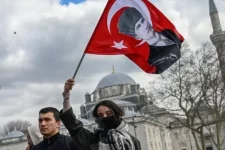Turkish police arrested 343 people during Friday protests across the country. These demonstrations started when authorities detained Istanbul Mayor Ekrem Imamoglu on Wednesday. The government accused him of corruption and helping terrorist groups just before his expected announcement as a presidential candidate for 2028.
President Recep Tayyip Erdogan spoke against the demonstrations Friday, stating his government would not give in to what he called "vandalism" or "street terror." He added they would not allow disruption of public order. Reports indicate police have questioned Imamoglu ahead of his court appearance today, with more protests likely to happen later.
Many see Imamoglu, from the secular Republican People's Party (CHP), as one of Erdogan's biggest political challengers. He was among over 100 individuals arrested, including politicians, journalists, and business leaders. Thousands protested in Istanbul Friday, where riot police reportedly used rubber bullets and pepper spray against hundreds of demonstrators. Similar clashes happened in Izmir.
CHP leader Ozgur Ozel called for another protest outside Istanbul city hall at 8:30 PM local time. He claimed the president feared these demonstrations and asked people throughout Turkey to protest peacefully. He urged citizens to "break down those barricades without harming the police, take to the streets and squares."
Officials tried to stop street protests by banning gatherings in Istanbul for four days right after Wednesday's arrests. Tens of thousands joined protests nationwide, and the ban was extended to Ankara and Izmir. Before Friday's demonstrations, Istanbul's governor, who supports Erdogan, closed the Galata and Ataturk bridges that lead to city hall.
Interior Minister Ali Yerlikaya criticized the opposition as "irresponsible" and announced 54 additional arrests for online posts that allegedly incited "hatred and hostility." He mentioned that 16 police officers suffered injuries during these demonstrations. The arrests of Imamoglu and others follow months of crackdowns targeting opposition politicians, journalists, and entertainment figures.
Opposition groups claim these arrests stem from political motives. The Justice Ministry has criticized anyone linking Erdogan to these arrests and insists courts operate independently. Imamoglu won his second term as Istanbul mayor last year when his CHP party dominated local elections there and in Ankara, marking the first nationwide defeat for Erdogan's party since he gained power.
The elections particularly hurt Erdogan, who grew up in Istanbul and served as its mayor during his rise to power. He has held national office for 22 years as both prime minister and president. Term limits prevent him from running again in 2028 unless he changes the constitution. The CHP plans to hold its presidential candidate selection on Sunday, and Imamoglu is the only candidate with 1.5 million members voting.
President Recep Tayyip Erdogan spoke against the demonstrations Friday, stating his government would not give in to what he called "vandalism" or "street terror." He added they would not allow disruption of public order. Reports indicate police have questioned Imamoglu ahead of his court appearance today, with more protests likely to happen later.
Many see Imamoglu, from the secular Republican People's Party (CHP), as one of Erdogan's biggest political challengers. He was among over 100 individuals arrested, including politicians, journalists, and business leaders. Thousands protested in Istanbul Friday, where riot police reportedly used rubber bullets and pepper spray against hundreds of demonstrators. Similar clashes happened in Izmir.
CHP leader Ozgur Ozel called for another protest outside Istanbul city hall at 8:30 PM local time. He claimed the president feared these demonstrations and asked people throughout Turkey to protest peacefully. He urged citizens to "break down those barricades without harming the police, take to the streets and squares."
Officials tried to stop street protests by banning gatherings in Istanbul for four days right after Wednesday's arrests. Tens of thousands joined protests nationwide, and the ban was extended to Ankara and Izmir. Before Friday's demonstrations, Istanbul's governor, who supports Erdogan, closed the Galata and Ataturk bridges that lead to city hall.
Interior Minister Ali Yerlikaya criticized the opposition as "irresponsible" and announced 54 additional arrests for online posts that allegedly incited "hatred and hostility." He mentioned that 16 police officers suffered injuries during these demonstrations. The arrests of Imamoglu and others follow months of crackdowns targeting opposition politicians, journalists, and entertainment figures.
Opposition groups claim these arrests stem from political motives. The Justice Ministry has criticized anyone linking Erdogan to these arrests and insists courts operate independently. Imamoglu won his second term as Istanbul mayor last year when his CHP party dominated local elections there and in Ankara, marking the first nationwide defeat for Erdogan's party since he gained power.
The elections particularly hurt Erdogan, who grew up in Istanbul and served as its mayor during his rise to power. He has held national office for 22 years as both prime minister and president. Term limits prevent him from running again in 2028 unless he changes the constitution. The CHP plans to hold its presidential candidate selection on Sunday, and Imamoglu is the only candidate with 1.5 million members voting.












